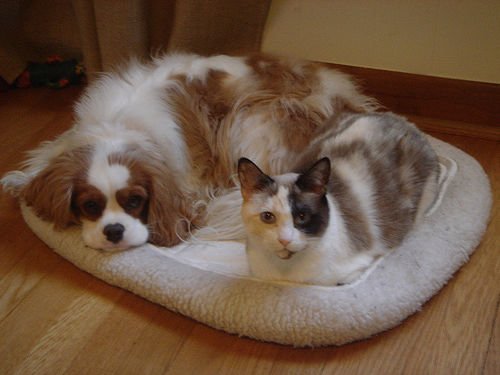
A reader recently wrote and asked if it’s true that even a pet’s love is conditional. He wrote, ‘From my own experience it is. Perhaps it seems so to people in general — that a pet loves them unconditionally — because they treat their pets very well. But if you’ve ever seen a mistreated pet, a dog for instance, snarling and barking at their abusive owners, then you’ll understand why I ask.’
Actually, ‘conditional love’ implies a choice. A dog, like any animal, has no choice about his values. His instincts have preprogrammed him to be a pack animal, to survive with the assistance of and loyalty to his masters. A dog is a domesticated version of a wild animal, and humans are notorious for seeing in the dog’s every behavior shades of human motivation. But this is mostly projection, not fact. Cesar Milan, the ‘dog whisperer,’ and other dog experts will accurately explain what’s really going on with dogs when they seem to act with human motivation or intention.
The crucial difference between an animal and a human is conceptual consciousness. Concepts are the integration of materials perceived by the senses. Like dogs and cats, humans have the capacity for sensation and perception. Unlike dogs and cats, humans are able to form concepts and to choose their values. Love is a response to values, and in the human being values are chosen, not instinctual.
Animals have no such choice. Animals don’t grow up to value some concepts and not others. They’re programmed to be more or less the way that they are. Animals—as much as we might love them—are never going to cure illness, discover new technologies or build bridges, spaceships and skyscrapers. At the same time, animals will never vote into office a Nazi government or murder, lie, or cheat on their spouses. Animals are not capable of justice (or injustice), since they are determined by their instincts and biological requirements alone. They will act within the limits of their in-born genetic structure, never venturing into the conceptual realm because they lack such a capacity.
It’s the distinctively human capacity for concept-formation that both enables and requires human beings to make choices. When you love someone, or when they love you, choices are involved. If someone loves you for your intelligence or sense of humor, it’s because these values have been chosen by the person who loves you as among the top. If someone loves you for your flaws, then a different kind of value system is at work, because different choices have been made.
Even people who claim that they don’t analyze their emotions are still subject to the value judgments implicit in their emotions. Consequently, they fall in love with—or choose to be friends with—a particular type of person.
The choices implied and required by a conceptual consciousness are what make all human love, by definition, conditional. It’s precisely this quality that most of our psychologists, clerics and social ‘leaders’ encourage or require us to ignore and condemn. They tell us not to be ‘judgmental,’ implying that we should really be more like our dogs or cats, sweet and loving (in most cases) but of limited capacity. Such advice tells you more about the mentality and motivation of the people providing it than it does about anything we might consider ‘wisdom.’
In my experience, the kind of person who eschews human beings in favor of the unconditional love of animals is afraid. Such a person has passed a harsh judgment on him- or herself, for whatever reasons—and consequently assumes others will do the same. In order to preempt the anticipated rejection of fellow human beings, this fearful person retreats into the understandably reassuring comfort of pets. While such a retreat represents an error, it also is an acknowledgement—even in the erroneous rejection of human companionship—that there is a real difference between animal and human/conceptual consciousness.
We humans are volitional creatures because we are conceptual. This is what makes us different from our cats and dogs, and there’s no escaping it. With the capacity for higher-level thinking comes the potential for greatness as well as evil. The possibility of evil should not wipe out the importance of goodness or greatness. As pleasurable as these creatures are—and they’re certainly a value to be celebrated and enjoyed—they’re no reason to flee our very natures as human beings.
Be sure to “friend” Dr. Hurd on Facebook. Search under “Michael Hurd” (Rehoboth Beach DE). Get up-to-the-minute postings, recommended articles and links, and engage in back-and-forth discussion with Dr. Hurd on topics of interest.
